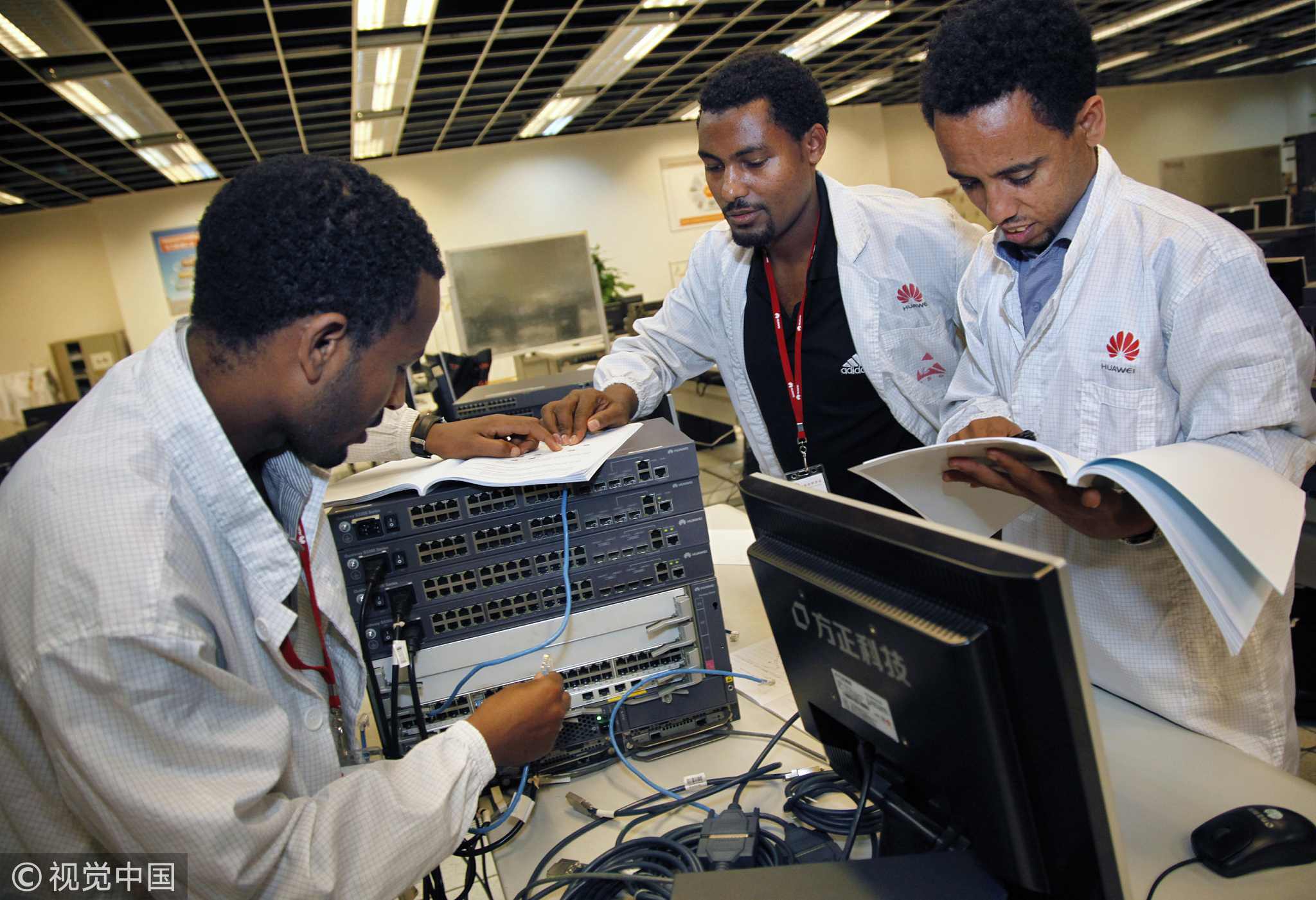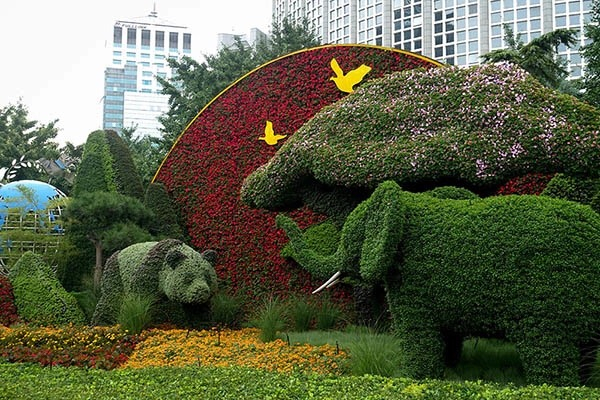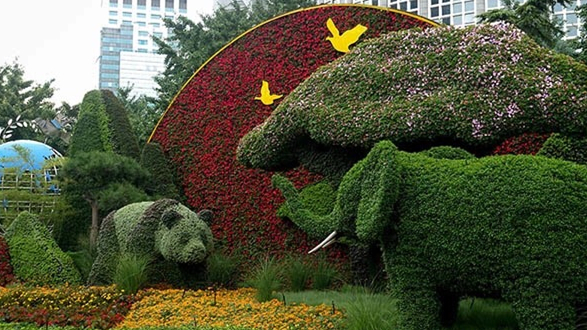China’s engagement with Africa spans over 600 years since the Ming Dynasty’s (1368-1644) Zheng He’s explorations. From the trading of ivory, myrrh and animals in exchange for silk and porcelain in those days to the grand present-day total of 170 billion US dollars in trade, China has its footprints in Africa’s history for years to come.
Africa is a wealthy continent of natural and human resources. In the past decades, China has underlined a policy of win-win cooperation with Africa in many fields and pushes the continent, which depends heavily on exporting raw materials, to diversify its economy and improve the investment environment.

People cheer and throw confetti, after Kenyan President Uhuru Kenyatta flags off a cargo train for its inaugural journey to Nairobi, at the port of the coastal town of Mombasa on May 30, 2017. /VCG Photo
People cheer and throw confetti, after Kenyan President Uhuru Kenyatta flags off a cargo train for its inaugural journey to Nairobi, at the port of the coastal town of Mombasa on May 30, 2017. /VCG Photo
Infrastructure construction
There is a saying in China that if you want to be rich, you need to build a road and a bridge. Wherever you go, you can see an upsurge in infrastructure construction on the African continent and a huge presence of China.
Booming areas such as highways, ports and power generation are boosting Africa’s economy and transforming its rich resources into sustainable development and tangible benefits for the people. Last year, a 480 km China-funded railway opened to connect Nairobi and Mombasa, reducing traveling time between Kenya’s two biggest cities by half and creating 46,000 jobs.

A woman using a TECNO phone in front of the Chinese smartphone brand's retail store in Kenya's capital city of Nairobi, May 9, 2017. /Xinhua Photo
A woman using a TECNO phone in front of the Chinese smartphone brand's retail store in Kenya's capital city of Nairobi, May 9, 2017. /Xinhua Photo
Financial upgrading
According to “2017 State of the Industry Report on Mobile Money” by GSMA, two-thirds of adults in Eastern Africa often use mobile payments and in sub-Saharan Africa, mobile money accounts have surpassed bank accounts thanks to affordable smartphones, which have provided the ground for mobile payments to flourish in recent years.
China plays a vital role in promoting Africa’s digital transformation. With their dual SIM slots, batteries with long standby times and outstanding cameras, Chinese mobile phone brands occupy four places among the top five vendors, according to the report for the Africa smartphone market in Q1 2018. The continent also benefits from the payment solutions provided by Chinese mobile giants including Alipay and Wechat Pay.

Engineers from Ethiopia, Africa, train on Huawei's networking equipment at the training center at Huawei headquarters in Shenzhen, China, September 15, 2011. /VCG Photo
Engineers from Ethiopia, Africa, train on Huawei's networking equipment at the training center at Huawei headquarters in Shenzhen, China, September 15, 2011. /VCG Photo
Tech cooperation
Africa’s close ties to China offers it a unique opportunity to keep learning from its biggest economic partner in agriculture, education, medicine and manufacturing. Chinese expertise in innovation, adaptability and creativity on the global stage can give local players valuable insights to capitalizing on their advantages. According to the World Bank, China already invests large sums of money in skills and infrastructure and is working closely with Africans to boost technology adoption.
Experts believe that the industrial upgrading brought by technological innovation is also imminent. No longer just staying in cooperation on shoes, clothing, and hardware, Chinese companies like Huawei, ZTE and DJI will lead manufacturing into the high-tech stage through the establishment of the R&D centers on African soil.

Chinese tourists taking pictures at a local elephant orphanage in Nairobi, Kenya, February 2, 2017. /Xinhua Photo
Chinese tourists taking pictures at a local elephant orphanage in Nairobi, Kenya, February 2, 2017. /Xinhua Photo
Cultural exchanges
Although official programs and projects have been the bread and butter of China-Africa culture exchange, in recent years non-governmental and mixed modes of cooperation have encouraged a flowering of new benefits, with provincial or municipal governments, private enterprise and schools getting into the act.
Tourism is the most direct way to experience African culture. With the opening of direct flights, relaxation of visa regimes and other incentives, many African countries are expecting the arrival of more Chinese. South Africa added visa centers and created direct flights to Johannesburg to attract more tourists. Kenyan tourism marketers even use WeChat, China’s popular social media app, for more Chinese visits.

An urban landscape was set up in Beijing's city center to celebrate the Beijing Summit of the Forum on China-Africa Cooperation (FOCAC) in the first week of September. /VCG Photo
An urban landscape was set up in Beijing's city center to celebrate the Beijing Summit of the Forum on China-Africa Cooperation (FOCAC) in the first week of September. /VCG Photo
New potential
In 2000, cooperation between Africa and China was institutionalized through the establishment of the Forum on China-Africa Cooperation (FOCAC). Since then, China's investment in Africa has seen a continuous rise.
Many Chinese entrepreneurs expanded their business overseas and African countries become their first priority. Meanwhile, many African traders seized opportunities to achieve their dream fortunes by cashing in on massive commodities in China, such as in eastern China’s Yiwu and southern China’s Guangzhou.
Today, a “China-Africa community with a shared future” is the buzzword to describe China-Africa relations. The two account for a third of the global population.







